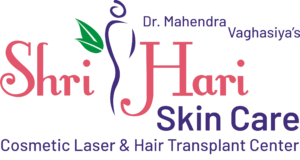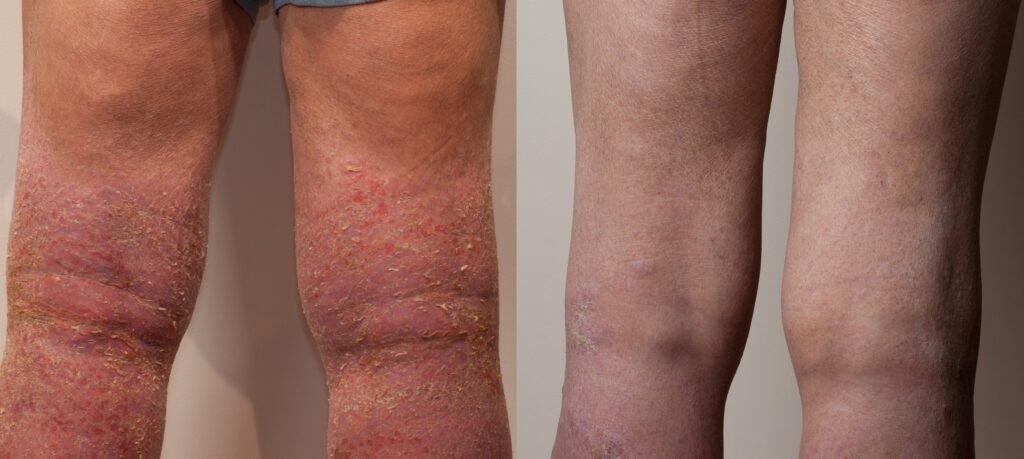
ECZEMA
If your skin is dry, itchy and red, you might have eczema (atopic dermatitis). It’s a common skin condition that isn’t contagious. You’re high risk if you have asthma or allergies. There are treatments that manage symptoms. As many as 15% to 20% of people experience eczema or another form of dermatitis at some point.
There are many different types of eczema that a person can suffer from.
- Atopic Eczema
- Contact Dermatitis
- Dyshidrotic Eczema
- Hand Eczema
- Neurodermatitis
Atopic Dermatitis:
This type of Eczema is chronic and inflammatory. While the exact cause of this disorder is unknown, Atopic Dermatitis occurs when the immune system goes into overdrive. Some of the common symptoms of Atopic Dermatitis includes:
- Dry, scaly skin
- Redness
- Itching
- Cracks behind the ears
- Rashes on the cheeks, arms & legs
- Open, crusted or weepy sores
Contact Dermatitis:
This particular disorder occurs when the skin comes in contact with irritating substances or allergens. These then cause the skin to become inflamed, causing it to burn, itch and become red. There are two forms of contact dermatitis. This includes:
- Irritant Dermatitis
- Allergic dermatitis
The most common forms of irritants include solvents, detergents, fumes, tobacco smoke, paints, bleach, wool, acidic food, skin care products that contain alcohol and certain soaps and fragrances.
Symptoms of Contact Dermatitis include:
- Redness and rashes
- Burning or swelling
- Blisters that may weep or crust over
Dyshidrotic Eczema:
This condition results in small, itchy blisters on the edges of the patient’s fingers, toes, palms and the soles of the feet. this type of itching disorder can be triggered by stress, allergies, moist hands and feet, exposure to metals like nickel, cobalt or chromium salts. This type of Eczema is far more common in women.
Symptoms of Dyshidrotic Eczema include:
- Small fluid-filled blisters on the fingers, hands or feet
- Itching
- Redness
- Flaking skin
- Scaly, cracked skin
- Pain
Hand Eczema:
This form of eczema is very common, and is a combination of both internal and external factors, which will include genetics as well as contact with allergens or irritating substances like chemicals.
Some of the symptoms of hand eczema include:
- Redness
- Itching
- Pain
- Dryness to the point of peeling and flaking
- Cracks in the skin
- Blisters
Neurodermatitis:
Also known as Lichen Simplex Chronicus, this condition is a itchy skin disease that is similar to Atopic Dermatitis. Patients suffering from this condition suffer from thick, scaly patches on their skin, which arise as a result of excessive rubbing and scratching of the area.
Symptoms of Neurodermatitis includes:
- Thick, scaly patches on the back of the neck, on the scalp, the back of the shoulders, on the bottoms of feet as well as the ankles, wrists and the back of the hands.
- Itching
- Discoloured skin
Diagnosis & Treatment:
Most forms of Eczema are diagnosed by a dermatologist through a detailed analysis of the patient’s case history and symptoms, as well as an exam of the skin.
The different forms of Eczema can be treated with medication. These medicines can help control the itching, swelling and redness caused by the condition.
In severe cases, prescription-strength cortisone creams, pills and shots may also be used. Other drugs that may be suggest to patients include antibiotics, to help treat infected skin as well as antihistamines, to help with the itching.
Make an Appointment
For appointment or any question contact us to make an appointment with Surat leading dermatologist Dr Mahendra Vaghasiya. Equipped with many years of experience in treating ECZEMA patients, he will evaluate your individual skin condition and discuss the treatment options with you. You may also send an email by filling Enquiry form at https://shrihariskin.com/contact and our team will respond to your questions or appointment request as soon as possible.

